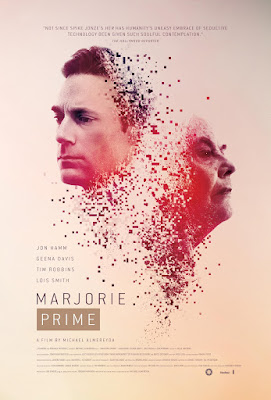RICORDI? translates from the Italian to the English question Remember?, which seems a most appropriate title for this 2018 film about memory, desire, fantasy and lost love. Early on, one character proclaims: "Memories lie -- making things that were bad seem good. Otherwise life would be unbearable."
Fair enough. And that seems to be the point (one of them, anyway) that the writer/director of this film -- Valerio Miele (shown below), whose terrific Ten Winters was shown at the FSLC's Open Roads festival of new Italian films some years back -- is making here.
From the moment that Miele's two leading characters, known only as He and She, first meet (below), we experience their view/memory of both the setting and the mood of this meeting, and their recall of these two things could hardly be more different.
She sees it all as a happy, lovely, brightly colored meeting, whereas he experiences the whole thing as something darker -- exciting maybe, as he's clearly quite attracted to her -- but as an event more than little tinged with the glum.
And is there any other actor who plays glum better than Luca Marinelli (above, left, and below)? I doubt it. This actor has one of those unusual hangdog handsome/ugly faces over which the camera consistently creams. Marinelli can play tragic (The Solitude of Prime Numbers), comic (Let Yourself Go) and just about everything in between.
His co-star, the lithe and lovely Linda Caridi (below and at right, two photos up), has a happier job of playing, for awhile at least, the more positive, glass-nearly-full member of the duo. He likes and encourages this, if only to balance out his own negativity, and so their relationship blossoms and even appears to grow.
But memory, though encouraged, also intrudes, and we learn that her life has been anything but idyllic, even though she would rather recall it that way, while his, if not nearly as awful as we'd imagine, has had plenty of low points -- mostly due to his own behavior. Late in the film, he observes, "It's not our fault. It started ending when it began." Well, yes, but doesn't everything, including life itself?
Memories, it turns out, are not quite the same thing as character, and finally, that is what's most missing from Ricordi? He and She prove to be a little too generic to pass muster. They're not one-note, exactly. But they are barely more than two: They're up or they're down.
The memories we see here don't finally coalesce into full or interesting human beings. What saves the film, however, are its often gorgeous visuals. The locations are memorable -- from the seaside (above) and an underwater swim (below)
to the sunlit woods (below) and the several fascinatingly appointed apartments, homes and general architecture seen throughout the film. Finally, it's these visuals, rather than the people, that carry us along.
Giovanni Anzaldo, below, does a nice job playing -- depending on whose viewpoint -- the third wheel, best friend or other man in our duo's relationship. Still, as artfully constructed as is Ricordi?, real, fully-rounded people are what's missing from this otherwise interesting, often beautiful, but incomplete movie.
From Distrib Films US and released here via Icarus Home Video, the film hits the street on DVD this coming Tuesday, April 14 -- for purchase and/or (eventually) rental.



























































